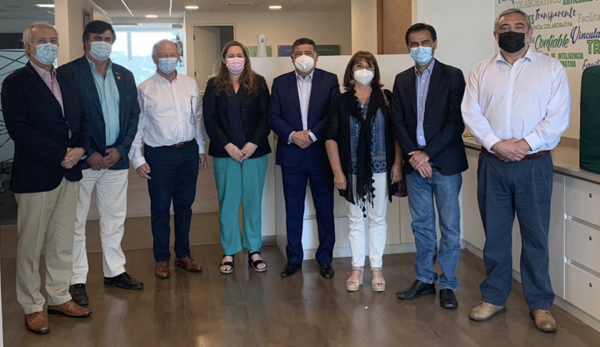Eurochile and the Regional Government of Biobío organized a successful circular economy webinar in Concepción with authorities from Italy
The need to complement economic development with a sustainable perspective that allows taking on the enormous challenge against climate change, was one of the key elements that was analyzed on January 20 at the Corporación Desarolla Biobío at the circular economy conference, organized by the Eurochile Business Foundation together with the Regional Government, with the support of the European Commission: A Sustainable and Circular Industry for the Biobío Region.
Regional and international authorities and experts participated in the event, addressing European advances in sustainable industrial development and the alternatives that exist in Chile for its promotion, specifically in waste treatment; where the active participation of all the agents involved in the processes is key when promoting effective change.
“With integration and union, with a modern vision of progress and the extensive and intensive use of the tools of scientific and technological progress, we will be able to deal with the enormous and complex challenge that lies ahead. Integral, economic, social and political sustainability is a necessary condition; and the circular economy is an important tool for companies to redesign and adapt their production and service models,” said Vicente Caruz, president of Eurochile.
The activity- carried out online and with-in person- with more than 100 virtual attendees, was attended by the Ambassador of Italy, Mauro Battocchi, who stressed that “the circular economy is not contrary to economic growth, but rather promotes it. The turnover of this sector in Italy reaches 88 billion euros and more than half a million people are employed in the sector”. This makes it one of the countries that is at the forefront in terms of waste management in Europe “with a recycling percentage of 67%, above the European average that reaches 55%; and for example, 83.3% of the waste that comes from the paper industry is treated”.
Raffaele Cattaneo, Minister of Environment and Climate, Lombardy, Italy, shared the experience of the region that recycles and recovers 90% of its waste, highlighting that “we have been a leader in traditional industrial development, but as regional government, we have decided that we must now become the leading region in the sustainable development model, where sustainability is not only an environmental issue, but mainly an economic and social development model.”
The regional governor of Biobío, Rodrigo Díaz Wörner, explained that “we are an industrial region: metalworking, wood and fishing, and over time we have developed a strong activity in services, engineering, logistics and technology; and in recent years we have had a growth in terms of food exports”, noting that the challenge that arises is “how to combine the generation of economic activity that gives employment to the people who live in our region with the need to look more beyond our regional limits and how we take care of the planet, to reduce the risk that climate change means”.
In this context, he indicated that “in the regional government we have made decisions that seek to maximize collaboration spaces between all the agents in the processes, with a view to the sustainable development goals to which the United Nations has called us. We are convinced that by cooperating with the business world, academia, society, public entities, and learning from other countries that have traveled a path before us, we can extract knowledge that we can apply to our territories”
The Director of the Center for Environmental Sciences EULA of the University of Concepción, Alejandra Sther, stressed the need to lower the national policies imposed on circular economy and sustainable development to the regional level, stating that “we should generate a regional roadmap with goals and specific activities to be carried out in a collaborative and participatory manner among all sectors: civil society, academia, public and private sectors; so that the regional government has an input on which to base itself to allocate resources, that the projects that serve to meet those goals have a greater possibility of being financed”.
For more information about the Circular Economy Meetings write to economiacircular@eurochile.cl

